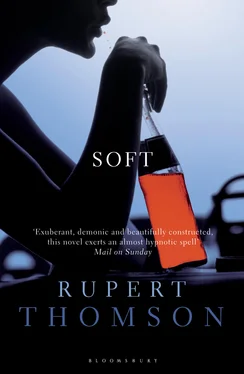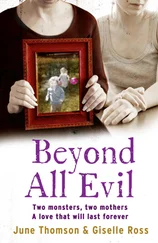Glade sipped her tea, which was almost cold. ‘We don’t see each other much,’ she said. ‘Hardly ever, really.’
That was why she had bought Giacometti — for company. If she was out, he would wait at the window, his face expressionless and round, not unlike an owl’s. At night he slept on her bed. Sometimes, when she woke in the dark, he would be sitting beside her, staring down, his yellow eyes unblinking, one of his paws resting in the palm of her hand.
‘It must be three months since I saw him.’ Raising her head, she realised that, finally, she had said something that made Sally feel better.
Sally had been going out with someone, but only for the past two weeks. He had a complexion that reminded Glade of balsa wood. If you pressed his forehead, it would leave a dent. Or you could snap his ears off. Snap, snap. What was his name? Oh yes. Hugh. A word that looked odd if you wrote it down. Like a noise. Hugh .
She watched Sally lift the saucepan off the stove and take it over to the sink. As the broccoli tumbled clumsily into a colander, the phone began to ring.
‘Could you answer that?’ Sally said. ‘It’s probably for you, anyway.’
Glade walked out into the corridor and picked up the phone. For a moment the line sounded empty, dead. Then she heard a click.
‘Hello?’ she said.
‘Glade? It’s your dad.’
‘Do you want me to call you back?’
‘No, it’s all right,’ he said. ‘I’ve got some coins.’
He didn’t ring often. It was difficult for him because he didn’t have a phone of his own. If he wanted to call her, he had to walk to the nearest phone-box, which was one and a half miles down the road. Three miles there and back, and sometimes it was out of order. Glade always felt guilty when she heard his voice.
‘Are you still coming up to see me?’ he said.
‘I’m going to try and come next weekend.’
‘On Friday?’
‘Yes,’ she said. ‘But I won’t be there till late.’
‘Not too late?’
‘No.’
‘I’ll cook.’ His sudden enthusiasm touched her, saddened her. It took so little to excite him. She saw him standing in the dim light of the phone-box, his head bent, his shoulders hunched, and darkness all around him, darkness for miles.
Sally looked up from her empty plate when Glade walked back into the kitchen. ‘I’m going to a party tonight. You don’t want to come, do you?’
Glade hesitated. ‘I think I’ll stay here.’
‘It’s all right for some,’ Sally said.
That night Glade cried herself to sleep. She had built a fire in the grate, but it stubbornly refused to burn. The few small flames seemed unconvincing, leaping towards the chimney, then falling back, shrinking, dying out. Sometimes, while she was crying, she thought of Tom, though she didn’t necessarily connect the one thing with the other.
The window of her father’s caravan showed through the darkness, one block of blurred light at the far end of the field. Though Glade had promised she would not be late, it was already after nine o’clock. It had been raining for most of the day, the bus moving sluggishly along the motorway as if wading through tall grass. After Birmingham the clouds had thinned a little, and she had watched a patch of pale-blue appear — that pure washed colour you sometimes see in the sky after a downpour. Further north, though, the rain had come down again, whipping at the surface of the land until it seemed to cower. The journey had taken more than seven hours.
Walking in the dark without a torch, she had the feeling she was dropping through the air, a kind of vertigo. She felt she might crash through that yellow window, land on the frayed scrap of carpet in a sprinkling of glass. Standing still for a moment, she looked around. A raw night, no moon. She thought she could smell the smooth wooden handles of farm tools. Probably she was just imagining it. She walked on. The sodden ground winced and flinched beneath her feet. By the time she reached the caravan, her shoes were soaked.
The door creaked open. Light spilled into the field.
‘Glade? Is that you?’
Her father stood in the doorway, a stooping, uncertain shape, his white hair oddly lopsided. She supposed he must have slept on it, but from below he looked like a king whose crown was being worn askew and might, at any moment, slip right off his head. A wisp of steam lifted from the wooden spoon he was holding in one hand.
‘Hello,’ she said.
They embraced awkwardly, Glade reaching up from the bottom step, her father bending down, their bodies forming a precarious arch.
‘Come on in,’ he said. ‘I’ve made a casserole.’ He stood back, looking gleeful, but sheepish too; he might have been confessing to a crime — something minor, though, like tearing up a parking ticket.
Philip Spencer had gone strange. Everyone said so. It started when his wife — Glade’s mother — ran off with an estate agent, a man eleven years her junior. The change in her father was sudden and profound. The week after the divorce he bought a caravan, hitched it to the back of his saloon car and drove out of Norfolk, which was where the family had always lived, leaving the house empty and the bills unpaid. He did not return. Once, about three months later, he passed through London on his way to the South-West. Glade was staying with his sister that winter, in a quiet area near Parliament Hill. Though he ate dinner in the flat with them, he insisted on sleeping in his caravan, which he had parked on the street outside. That night he fell out of bed. When he stood up, half-asleep, not knowing where he was, it seemed to him that the floor was tilting. He thought he must be dreaming. In the morning, though, the floor still tilted. It turned out that somebody had slashed one of his tyres. It was the first of many adventures. For the next two years he travelled the length and breadth of the British Isles, always sleeping in his caravan, which he had christened the Titanic in honour of that night in London. He sent Glade postcards from Ben Nevis, Lake Coniston, Penzance. Then, halfway through her final year at art college, he called her from a phone-box somewhere in Lancashire. It’s time for me to put down roots, he told her. He had towed his caravan into a field and replaced the wheels with piles of bricks. He had sold his car. The man who owned the land, a farmer by the name of Babb, was only charging him a few pounds a week. His overheads were low — so low, in fact, that he could easily live off his pension. From now on, he would lead a simple life. Babb kept himself to himself, and so, her father said, would he.
Glade pulled her shoes off and stood them by the door. She sat at the narrow formica table in the galley while her father peered down into his casserole and stirred it with the wooden spoon.
‘How long can you stay?’ he asked.
‘Only till Sunday. I’ve got a double shift on Monday.’
He nodded. ‘This waitressing, are you enjoying it?’
‘Sort of, yes.’
‘It’s good you don’t commit yourself to anything just yet,’ he said. ‘There’s plenty of time for that.’ He stopped stirring and stared at the wall above the stove. ‘I learned the hard way.’
She watched him for a moment, puzzled, but he chose not to elaborate. She looked around. Every object in the caravan seemed to be covered with a fine coating of dust; it was as if all the things he owned had furry skins, like peaches. She hadn’t visited since June, she realised, and it was now October.
‘Like a drink?’ Her father was standing in front of an open cupboard, looking at her sideways. ‘I’ve got some wine.’ He held it up. Valpolicella. ‘Not very good, I’m afraid.’ He put the wine on the table and reached into the cupboard again. A self-conscious, crafty look appeared on his face. ‘A drop of whisky?’ He showed her a bottle of Teacher’s.
Читать дальше












